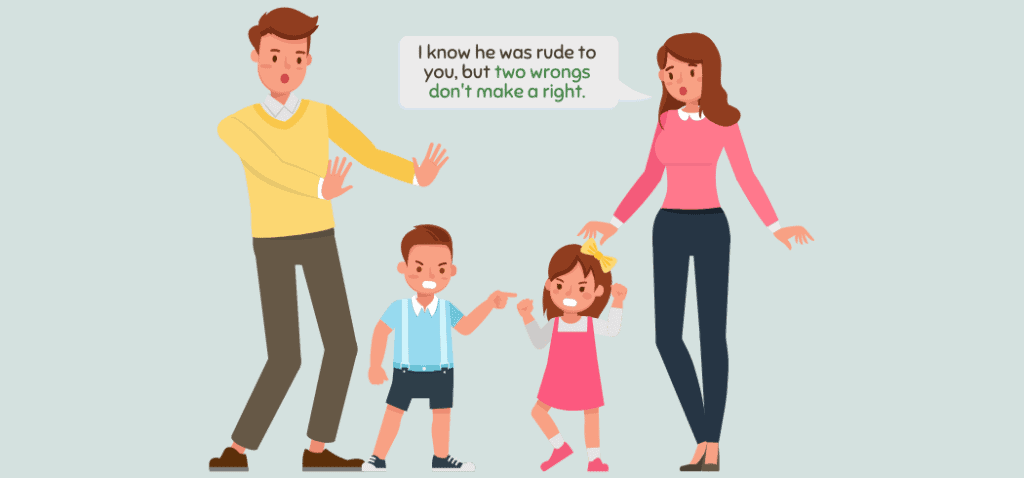Let’s talk about a phrase you most likely heard before: “Two wrongs don’t make a right.” If you’re a parent of two or more kids, you’ve probably even used the phrase yourself from time to time. But what does it actually mean, and where did it come from? That’s what I’m about to break down for you with details and sentence examples.
What Does ‘Two Wrongs Don’t Make a Right’ Mean?

When two people are about to fight over something to reach a better means, you tell them two wrongs don’t make a right, meaning that fighting won’t solve anything.
It’s a pretty straightforward concept. Let’s say you and a friend got into a fight, and they said something hurtful to you. Your natural response would probably be to say something hurtful back. Honestly, that’s what most of us would do, right?
But that’s not the right way to handle the situation. Instead, you could say something like, “I know you’re upset, but two wrongs don’t make a right. Let’s try to talk this out instead of saying hurtful things.”
As a parent of two kids, I’ve had to break out this saying repeatedly. They always find something to fight about, and it almost always ends in a face-off. That’s where I step in and break it up and remind them that fighting won’t solve the problem or two wrongs don’t make a right.
Origin of 2 Wrongs Don’t Make a Right
The expression is said to be traced back to the 1700s. Benjamin Rush, one of the signers of the U.S. Declaration of Independence, is credited with citing the sentiment in a letter in 1783. But that’s actually incorrect, as his direct quote was, “three wrongs will not make one right,” and he was referring to the Philadelphia Mutiny. Although the phrase we’re talking about is clearly derived from what Benjamin said, it’s unclear exactly when the third ‘wrong’ was dropped.
‘Two Wrongs Don’t Make a Right’ Examples in Sentences
You’ll always get the context in my guides because I firmly believe in examples. When I’m trying to understand the meaning and how to use a certain word or phrase, I always look for complete sentences that use it.
- I know he was rude to you, but two wrongs don’t make a right. Let’s find a better way to handle this.
- She may have taken your pencil, but retaliating by taking hers isn’t the solution. Two wrongs don’t make a right.
- I understand your boss was unfair, but spreading rumors about them is not the answer. Two wrongs don’t make a right.
- Just because your friend betrayed your trust doesn’t mean you should betray theirs in return. Remember that two wrongs don’t make a right.
- I know you’re angry about the situation, but getting into a physical fight won’t solve anything since two wrongs don’t make a right.
Two Wrongs Never Make a Right
I hope that helps explain things about the phrase. It’s one as old as time but still heavily used today. Remember, it’s best to use the phrase when dealing with two people or situations where the outcome will be negative if they both continue.
